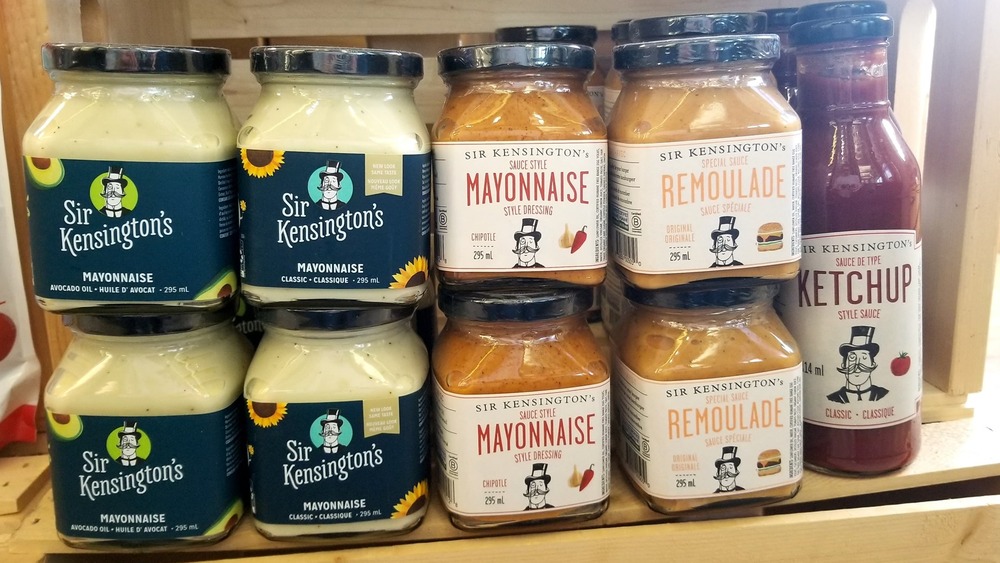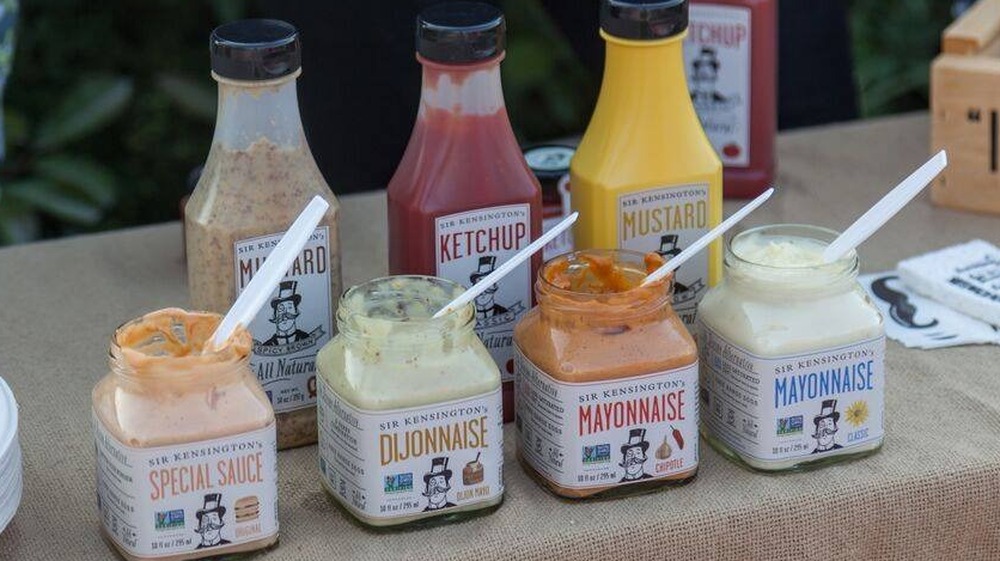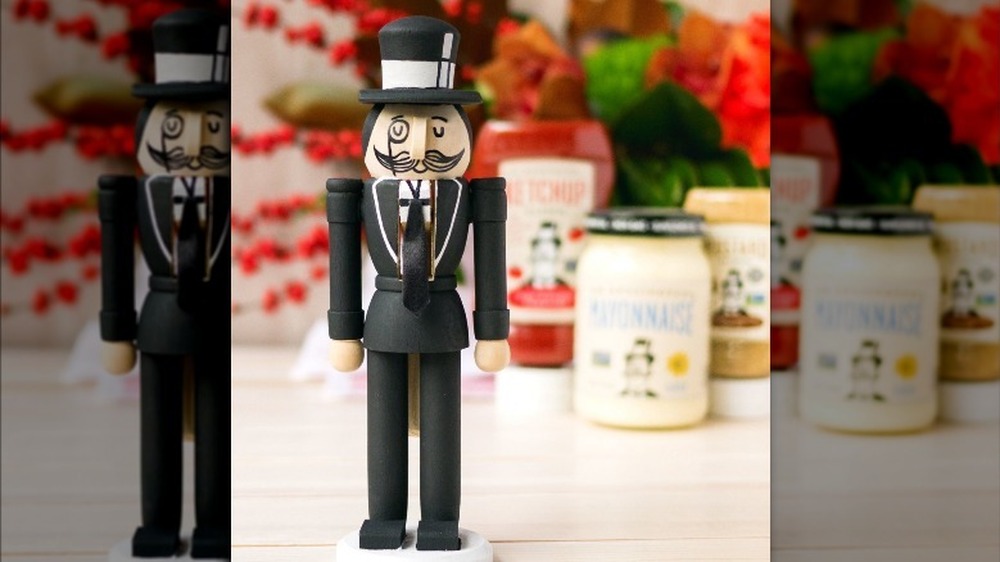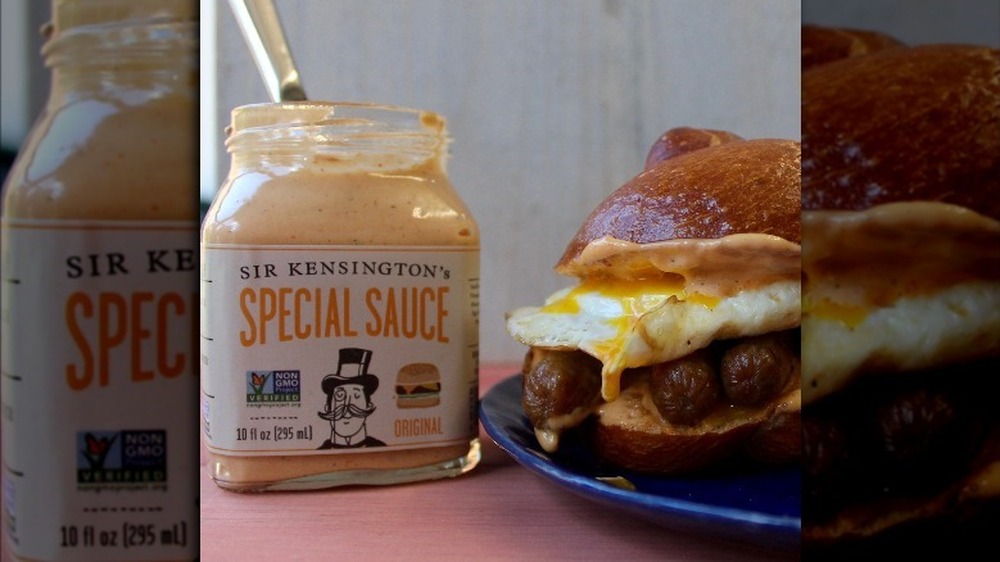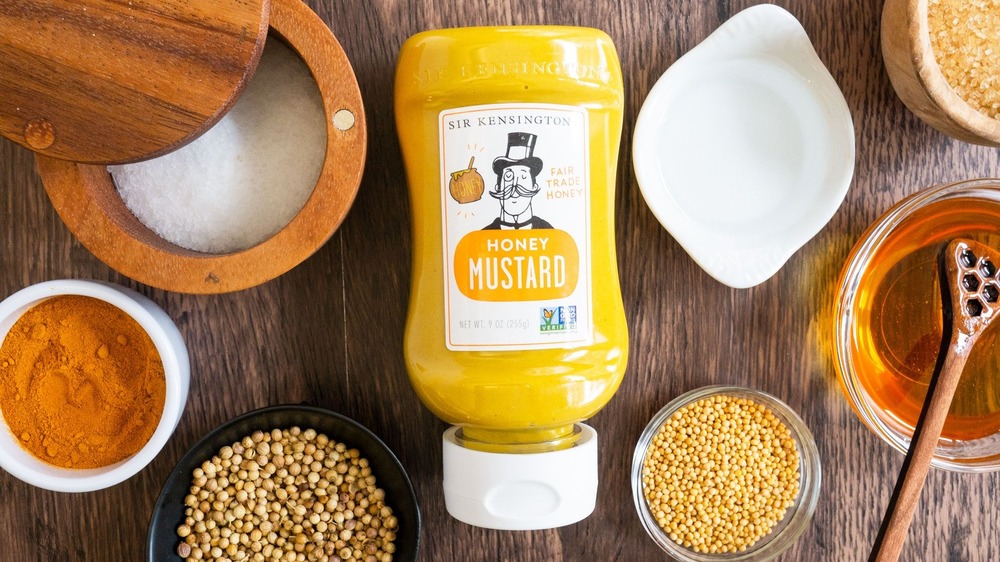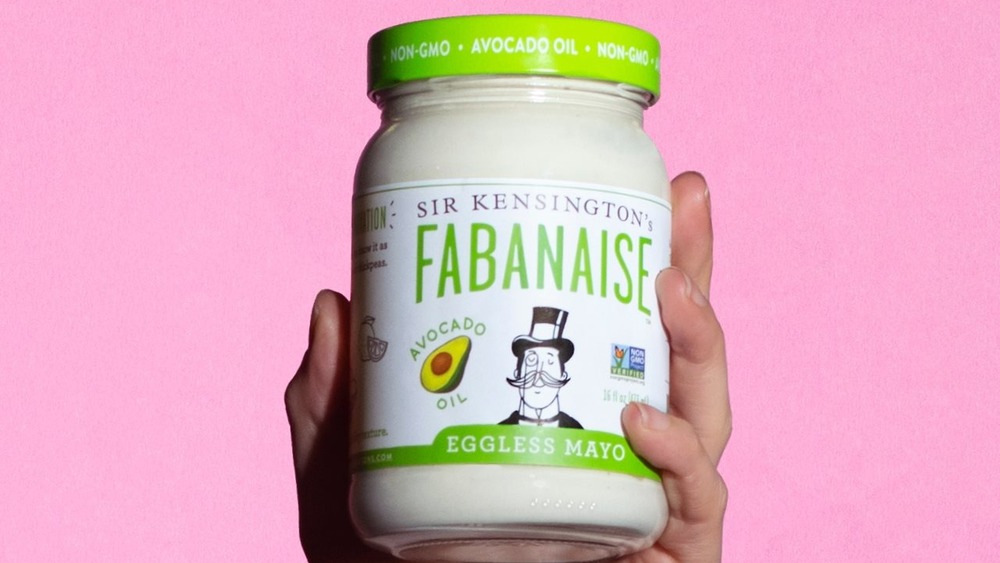What You Didn't Know About Sir Kensington's
In the US, most hearty home meals are never quite complete without a solid serving of ketchup. Cookout? Ketchup. Making fries from scratch? Ketchup. Meatloaf? Ketchup. So it's a wonder that, for years, shoppers have settled for any old version of the squeeze bottle. Cue Sir Kensington's, a natural ingredient condiment brand that stepped onto the scene in 2010, starting with ketchup and since expanding to more products, all made from less sugar and boasting more taste than traditional store-bought brands (per Forbes).
Their mission: Gourmet-level natural ketchup, like the kind that you find in a local hole-in-the-wall where they bottle their own made from scratch. So, instead of smothering a burger in ketchup packets just to disguise how overcooked it might be, with this brand, you'll want to go overboard because the natural flavor is simply that good with a peppery kick. While The Takeout's blind taste test of different ketchup options reports that not everyone is sold on this sophisticated sauce, others swear by it. Either way, Sir Kensington's is quickly learning just how to shake up the condiment game — and doing it well.
Sir Kensington's first decade has been filled with success
Sir Kensington's began on a mission to disrupt the ketchup world around 2010, when a few Brown University students — without a single bit of culinary experience under their belts — decided that it was time Heinz was kicked down a notch. The group, which consisted of Scott Norton, Mark Ramadan, and co-founders Win Bennett and Brandon Child, debuted their first two flavors at an annual New York food show (via Fast Company). Success came quick — far quicker than the last drop out of a ketchup bottle — as grocers like Whole Foods and boutique shops like Dean & DeLuca began to stock the product. Trendy New York restaurants started serving their dishes with a side of the sauce, too, turning the brand into a swanky city staple.
According to the New York Times, Sir Kensington's mission to make a dent in the condiment industry hit a huge milestone back in 2017, when the brand was acquired by retail giant Unilever.
Nowadays, Sir Kensington's isn't just New York exclusive, and they aren't just about ketchup, either. The company has expanded its line to include all sorts of dips and dressings — you might as well purge your fridge's sauce shelf because this lineup is full of unmatched flavors made with great ingredients. You can find everything from the OG ketchup to Raspberry Pink Peppercorn Vinaigrette and even a Curry Marsala Everything Sauce (per Sir Kensington's) at many stores.
Who is Sir Kensington, anyway?
Sir Kensington is, essentially, the Santa Claus of condiments. The built-in mascot and namesake for the brand first came to mind before the product was even created, according to Fast Company. In fact, Norton and Ramadan had their mission in mind before they even had their prototype, which was to add a bit of variety to the ketchup world. Since Heinz was notoriously American, the SK founders decided that the best route to take would be to do everything completely opposite — and so, the regal and posh Sir Kensington was born. Forbes calls him "refined" and notes that the mascot is "pervasive to the branding" of the company, which has been a key factor in Sir Kensington's mounting success.
The image of a suited man with a monocle (not unlike Rich Uncle Pennybags) represents all things good: good ingredients, good flavor, good quality, and, well, doing good things for the world around us. And while Sir Kensington is intended to represent all of that good behind the brand, it should be noted that he is, in fact, not real.
Good branding has been instrumental in Sir Kensington's growing sales
According to Bloomberg, Sir Kensington's started their first year with an impressive $40,000 in sales. Fast forward a decade, and Unilever purchased the company for an estimated $140 million — that's a whole lot of ketchup. The group behind the condiment line credits the company's takeoff with their massive efforts in branding. Sure, the products taste great — once you load a burger up with a dollop of the black-peppered, spicy ketchup, you won't be topping it with anything else — but at the end of the day, the founders insist that consistent, interesting, and relatable branding is what carved Sir K's path forward.
Scott Norton, one of the original founders, spoke with Fast Company about how marketing played a pivotal role for the company. In the article, he compares creating a brand with creating a religion, and said that "religion is a highly motivating and emotional thing, and that's what a good brand is, too."
And truly, if you don't believe in your product and put some true heart into it, no one else will — and thus, with Sir Kensington's push to be different, shoppers are on their way to becoming passionate about ketchup once again.
Sir Kensington's prides itself on environmentally sustainable practices
As a certified B Corporation (per Sir Kensington's), sustainability is another key part of this company. From the get-go, the founders chose to sell ketchup in wide-mouthed glass bottles to be more environmentally responsible and help differentiate themselves as upscale and unique when compared to other brands. With their rapid growth, however, the company has had to pivot — sometimes even to the dreaded plastic bottle, since glass is heavy to transport and therefore increases the company's carbon footprint. Nonetheless, Sir Kensington's remains transparent about their environmental impact and publicly seeks ways to improve.
Sir Kensington's says that nearly 75 percent of the company's packaging is made out of glass, with only the remaining quarter spent on plastic, metal, and paper. And improvements are happening every day. While in 2021, 24 percent of Sir Kensington's bottles are made from recycled plastic, the company plans to increase that number to 100 percent by 2022. Given their track record, we're sure they're full steam ahead on that progress now.
Sir Kensington's is also a pioneer in the vegan food industry
Believe it or not, Sir Kensington's greatest claim to fame thus far hasn't even been their spicy ketchup or quirky English mascot. Instead, it's their vegan mayonnaise.
Thrive Market explains that the company first introduced their Classic Vegan Mayo, since dubbed "Fabanaise" by enthusiastic customers, in 2020. Unlike traditional plant-based mayonnaise, the Sir K's version made use of a new ingredient: aquafaba (hence the "fab" in "Fabanaise" — though it's also fabulous). Aquafaba is the emulsifying water left behind after boiling chickpeas, and in an innovative move, an intern noted that it could make a great egg substitute.
Prior to this discovery, aquafaba was not commercially used to create vegan alternatives for foods like mayo. Customers undoubtedly love the creamy texture from this surprising ingredient with one reviewer even calling it "a plant-based, mayo lover's dream" on Sir Kensington's website. And thus, "Fabanaise" made its way onto shelves and into a whole new subset of shoppers' hearts, just like the company's staple ketchup all those years ago.
